Conversation Piece:
Tenor DAVID CANGELOSI
By Bruce Duffie
Tenor David Cangelosi is emerging as one of the strongest
participants
in the specialized field of comprimario singing. His
roles,
though not generally large, are among the most important in opera
because
of their dramatic significance. He moves the plot along or brings
the most important news to the leading characters, and without these
special
moments, the performance would founder. And these all-too-brief
lines
must be delivered on the same high level as the rest of the musical
material
or else there is an obvious weakness in the evening's presentation.
Be assured that when these roles are taken by Cangelosi, their
impact
is rendered exactly as the creators wished, and the audience is carried
along without noticing any diminution whatever - and this is how it
should
be.
Having been nurtured by the Lyric Opera Center, where he
participated
in both classes and performances, Cangelosi is continues to provide
Chicago
audiences with stellar moments while advancing his larger career in
other
major houses.
In October of 2002, I had the pleasure of chatting with David
Cangelosi.
His enthusiasm was immediately apparent as he chatted with pride and
glee
about his earlier career, the current roles, and his entry into Wagner
- where the role of Mime in Siegfired looms large and could
easily
catapult him into a whole new realm of international demand. Here
is much of what we talked about during that afternoon . . . . .
Bruce Duffie: You are a graduate of the Lyric Opera
Center for American Artists. Was that great training?
David Cangelosi: Before I entered the Opera Center
in
1996, I had a long career working in nightclubs, Las Vegas showrooms,
Atlantic
City, that kind of thing.
BD: Pop tunes or rock tunes?
DC: No rock because that wasn't my voice, but I did
a lot of standards and Broadway music, some light classics.
BD: You were a crooner????
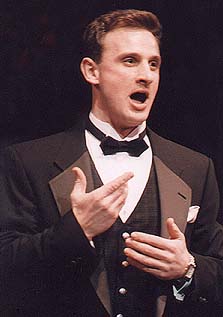 DC:
That's kind of a way to put it, although I didn't croon. In fact
when I would shake hands and meet some people after shows, they'd say,
“Oh, you belong in the opera. You should be in the opera.”
At that time I was still singing baritone and I had sung as a baritone
for years doing musical theatre and what not.
DC:
That's kind of a way to put it, although I didn't croon. In fact
when I would shake hands and meet some people after shows, they'd say,
“Oh, you belong in the opera. You should be in the opera.”
At that time I was still singing baritone and I had sung as a baritone
for years doing musical theatre and what not.
BD: You had had training with your voice?
DC: Yes. I got a standard Bachelor of Music
degree
in vocal performance when I was in Cleveland, Ohio.
BD: Your teachers should have known what your voice
was capable of.
DC: Oh yes, and yet there was one crucial
mistake.
I'm not even sure if it was a mistake that anybody made, or if it was
partially
my doing, and that was the fact that I trained and sang as a
baritone.
Everybody kind of looked at me cross-eyed because I had heard for so
many
years that maybe I should be singing tenor. I was not sure, and I
was convincing enough as a baritone until I hit the opera
business.
Then there was something terribly wrong. I'd lose the bottom of
my
voice. It would get totally swamped by an orchestra, and the top
kept loosening up. I wouldn't say I had an unlimited top, but I
had
a freer top than middle or low. Finally, when I was working in
the
summer music program in Aspen, a teacher pulled me aside and said,
“Explore
this and explore it well. I can't make the decision for you, but
I'm telling you that I think you will be happier singing tenor, and I
think
you can have an operatic career as a tenor. What kind of tenor
we're
not exactly sure, but give it a good workover.”
BD: Instead of being a mistake, perhaps it was just
that your voice needed this much time to develop.
DC: It could have been a natural
progression.
That's the other issue and we'll never know. Maybe it was just
partially
my body. It's certainly not uncommon for baritones to switch to
tenor.
BD: And of course the true heldentenor is a baritone
with a big top…
DC: …and the driving middle, a strong, steely middle.
BD: Do you feel that's where you're going, or do you
want to stay with the lighter parts?
DC: That's a real good question because when I
started
singing tenor, I started with the lighter, more leggiero roles.
What's
different about me, that separates me from a lot of other singers, is
that
I have an extremely physical way about me on stage. I can dance
very
well, I can move very well and I have a good ability to act and to do
different
kinds of roles.
BD: Which of course lends itself very well to the
character
parts.
DC: The high end character parts are what I really
try
to stick with, and then I walk a little bit of a tightrope and cross
over
and do semi-romantic roles like Prunier in La Rondine, which is
a beautiful lyric sing. I also do Cassio in Otello, and
some
others that are considered character roles, but sometimes they'll go to
a leading-man tenor, depending on what the director or the company is
looking
for. I've been very successful at skating along that line, and
people
have given me the opportunity to do that. The biggest challenge
for
me was not only getting the voice lean enough to still allow it to
bloom
on top, but to put the brakes on and just start slow and keep moving
through
a progression of roles that leads me to the things that I ultimately
want
to sing as signature roles. One of them is finally coming up now,
and of all the roles in opera, it has to rank in the top twenty of most
towering roles ever written for anyone: Mime in Richard Wagner's
Siegfried.
I will do that at Lyric Opera of Chicago for the first time in the 2003
– 2004 season.
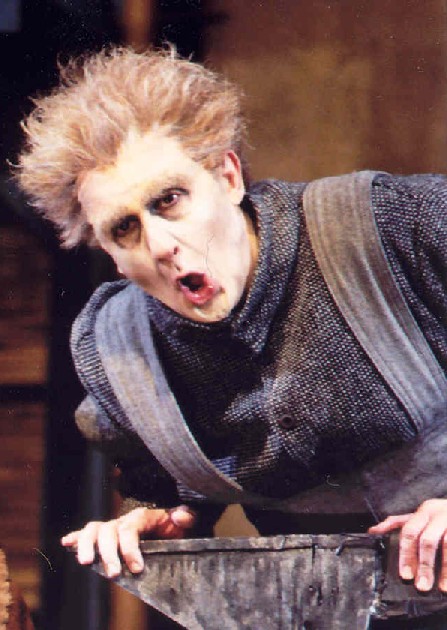 BD:
So have you been immersing yourself into a lot of Wagner to be able to
do that role?
BD:
So have you been immersing yourself into a lot of Wagner to be able to
do that role?
DC: Yes. I've been a long-time fan of
Wagnerian
operas. Every once in awhile there's a style of music that just
speaks
to you, and it goes beyond explanation. It seeps down into your
bones,
you can't get it out of you. It's like an addiction. It has
you, and you're hooked forever. It must be the harmonic style
that
Wagner uses, the exquisite sort of tension and release. I'll
never
forget one of the very first experiences I had where I felt this sort
of
“down in your bones, down in your body” sort of love for it. It
was
a PBS telecast of Lohengrin way back in 1980. The first
time
I ever listened to Siegfried and heard the role of Mime, I just
KNEW, down in my heart, that that was a role for me to sing. Of
course
I said to myself, “Oh, but you can't sing it, you're a baritone.”
So when people finally convinced me to switch voices, which is not an
easy
task, I knew that this role was a possibility. It's one of the
most
difficult roles to learn. There is some nice singing for Mime,
and
there are some extremely difficult passages for him to sing. It's
a cross between a heldentenor and a character tenor at the same time.
BD: And you're onstage for the whole of the first
act!
DC: Ninety minutes non-stop! I never leave the
stage. I'm the only one who doesn't leave the stage, which means
I'm the only one who doesn't get a chance to have a drink of water, so
we'll hide it somewhere on the stage.
BD: When you're cooking up the potion for Siegfried,
you can taste-test it!
DC: Exactly. It's an interesting role on many,
many levels. It's a challenge to sing, it's a challenge to
learn.
There are so many words that have to be sung, and so much harmonization
of the words. There's a lot of alliteration in this role.
BD: And he is the impetus for moving the drama, for
pushing the action forward more than Siegfried or even Wotan.
DC: No question about it. That's why I say
he's
one of the most towering roles ever written because everything revolves
around Mime. If you don't have a good Mime on stage, it's going
to
be a long, boring night in the opera house.
BD: If they give the role to a has-been tenor or a
not-really-good
tenor, then it becomes a weak spot in the opera. For you to make
it equal to the lead tenor and the baritone and the soprano in the
evening,
makes for a much more satisfying performance.
DC: I couldn't agree with you more. Truer
words
were never spoken. It's a shame when an opera producer or an impresario
thinks he can skimp on that role. Wagner himself said he wanted
Mime to be played by an “outsung” heldentenor, but in all reality no
one
wants to be the weakest link in any cast. If you relegate Mime to
an old singer who has had, perhaps, a marvelous career but has a
weakened
voice at that point, it might fit the dramatic action but this is a
real
singing part.
BD: And a real athletic one!
DC: Right. If you're going to have an
outstanding
Wotan and an outstanding Siegfried and a fantastic Brünnhilde
later
on, I want to keep the audience's attention focused on me when I
sing.
I want them to think, “He's a player along with everyone else.”
BD: What would happen if Mime had been able to get
the
ring? That's what he wanted.
DC: The world as we know it would not exist!
Of
course, had he gotten the ring, he would be doomed to die.
BD: But would he have tried to exert power over
Alberich
and everybody else?
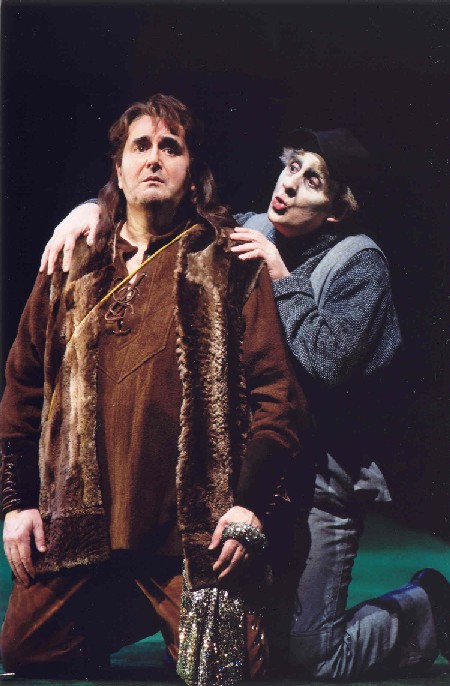 DC:
No question. During the forging scene he goes on a little
diatribe
and starts getting all intoxicated with the fact that he thinks he's
smart
enough to fool Siegfried, and Siegfried's going to kill Fafner and then
he's going to get that ring, and then the whole world, including
Alberich,
is going to bow to him. He's real heady. When I did a
recording
of the Forging Scene with Placido Domingo, we spent about eight hours
working
on it. It was a grueling eight hours. That's a hard
scene
to do over and over and over. When we took a break, Placido came
to me and said, “You really do have fun singing, don't you?” and I
said,
“Boy, I sure do.” He told me that he had even entertained the
idea
of possibly singing the role of Siegfried at one time, but after doing
the recording he said, “I just don't think I could get through the
whole
role in one night.” To record it might be one thing, when you can
do it little by little, but Siegfried sings all night long and it's a
really,
really tough singing.
DC:
No question. During the forging scene he goes on a little
diatribe
and starts getting all intoxicated with the fact that he thinks he's
smart
enough to fool Siegfried, and Siegfried's going to kill Fafner and then
he's going to get that ring, and then the whole world, including
Alberich,
is going to bow to him. He's real heady. When I did a
recording
of the Forging Scene with Placido Domingo, we spent about eight hours
working
on it. It was a grueling eight hours. That's a hard
scene
to do over and over and over. When we took a break, Placido came
to me and said, “You really do have fun singing, don't you?” and I
said,
“Boy, I sure do.” He told me that he had even entertained the
idea
of possibly singing the role of Siegfried at one time, but after doing
the recording he said, “I just don't think I could get through the
whole
role in one night.” To record it might be one thing, when you can
do it little by little, but Siegfried sings all night long and it's a
really,
really tough singing.
BD: Do you see yourself doing Loge in Das
Rheingold,
or would you rather do both Mimes?
DC: I am learning both Loge and Mime in Das Rheingold
so I'll have them both as possibilities. So, along with the Mime
in Siegfried, that will complete the roles in the Ring
cycle
which are appropriate for me.
BD: You don't ever see yourself pushing into the
title
part?
DC: Never! Absolutely not! In the opera
business it's important to exploit all of your talents, so if I move
well,
I want people to know I move well. If I sing well, I want people
to know that I sing well. If I can dance, I want them to see me
doing
unique dance moves. I can fight and do stage combat well, which I
did in the production of Billy Budd last year. It was
probably
one of the most realistic stage fights ever seen. I want people
to
know that I can do that well. The realm of work that I do in the
opera business exploits all of my talents. It allows me to use
all
my God-given talents to the maximum. It's also very, very
important
to know where your limits are. I would rather be the greatest Mime on
the
face of the earth than a mediocre to poor Siegfried any day of the
week,
and that's exactly what I would be if I sang the title character.
BD: I assume, though, that you want to balance doing
Mime a few times a year with some Pruniers and other lovers.
DC: Matthew Epstein, the Artistic Director of Lyric
Opera, talked with me at great length about this recently. He
said,
“You do all these roles really well, but we have to make sure that you
continue to use the lyric side of your voice, that you don't lose it.
That's
very important for you to keep.” So I will do Beppe in Pagliacci
with that beautiful serenade, and Goro in Madame Butterfly,
which
has some beautiful lines to sing. Prunier in La Rondine
is
a very elegant Puccini role that uses the most lyric part of your
voice.
In Sweeney Todd that we're doing now, Toby has to go out there
and
sing one of the most beautiful songs of the night. That is very
gratifying.
BD: Does that hark you back to your Broadway and
Vegas
days?
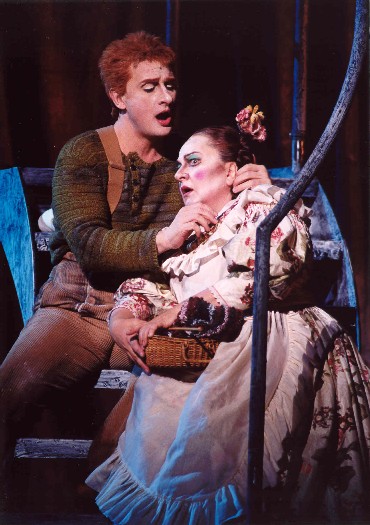 DC:
It certainly does! Those were great fun, but it doesn't make me
want
to go back because that chapter is closed. The reason I moved
into
opera seriously was because that was about the only thing in singing
show
business that I hadn't tried, and it was a challenge for me.
DC:
It certainly does! Those were great fun, but it doesn't make me
want
to go back because that chapter is closed. The reason I moved
into
opera seriously was because that was about the only thing in singing
show
business that I hadn't tried, and it was a challenge for me.
BD: You might be the ideal person to ask, since you
were in show biz and have done musicals. Is it different, now
that
you've trained and sung opera, to come back to what is essentially a
musical
on the operatic stage?
DC: Yes, it is different, because it is different
music.
The weight of the music is a completely different style. It's a
different
manner of singing. Beautiful singing should always be beautiful
singing,
and good technique should always be good technique, but you wonder how
some people on Broadway can do eight shows a week. It is taxing,
and they have my high esteem for being able to do it, but in most cases
the music allows them to sing that much if they do it well. You
couldn't
sing Siegfried eight times a week!
BD: You can't sing Butterfly eight times a
week,
either!
DC: Right! I keep that in mind as I move along
and plan out my itineraries. I'm booked well into 2007 now.
BD: Is that a comforting feeling?
DC: Yeah. It's also kind of weird to know that
I'm going to be at the Paris Opera in 2007 doing such and such.
But
it's a comforting feeling in that I can look ahead and know that I'm
going
to be working. A lot of people in show business don't know what
they're
doing three months from now.
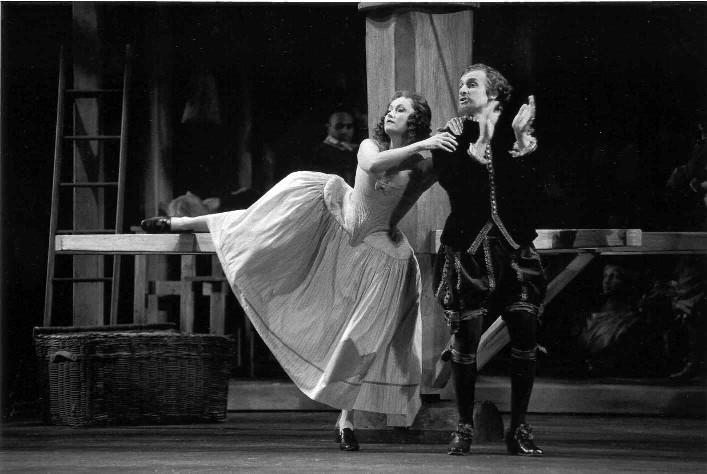
BD: Is it tricky to set these contracts in 2007, not
for where you are but for where you're going to be?
DC: Yes. In fact when I do my long-range
planning,
I ask, "If I'm going to do this in 2007, do I have a lyric sing
somewhere
in that calendar year?" Okay, yes, go ahead and check it
off.
"Do I have a good character acting role that I want to do in
2007?"
Okay, that one's in place. If there's a hole somewhere in the
artistic
design of what I want to do, I try to get a role that fits.
Sometimes
it works out and sometimes it doesn't. When they gave me the role
of Mime, I was signed to do this almost four years ago.
BD: And you knew you'd grow into it?
DC: That was their idea too. I did sing
it.
I actually auditioned for it. I had the whole role prepared and I
let them choose whatever they wanted to hear. The people at Lyric
Opera thought it was good then, but they were certain that over the
course
of four years time that it would grow into my voice and that I would
grow
into the part. It's is not a perfect science. Sometimes they'll
think
a person's going to grow into the role. They can sing it now, but
they'll grow into it and it'll be real good in four years, and sometime
it is not. Sometimes the calculation is wrong.
BD: I hope, though, that in 2007 you don't feel that
you're being held back, and you can look forward to more roles all the
time.
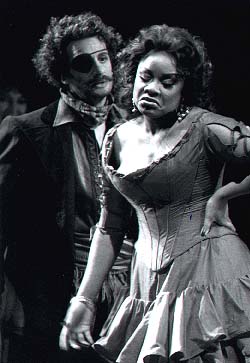 DC:
There are favorite roles that I will do all the time that I'm really
pleased
and happy to do. When Bizet wrote Carmen, he expected his
Don José to be a tenor, of course. Not my kind of tenor,
not
my kind of voice, but everyone always thought the role of Le
Dancaïre
was a baritone and Le Remendado was the tenor. Actually it was
written
for two tenors. Dancaïre was originally listed as a tenor
role,
and Remendado as well, so when Carmens come popping up, I will
never
do Remendado. There have been a couple of administrative
screw-ups,
and they booked two Remendadoes as opposed to a Remendado and a
Dancaïre,
and they asked me if I could switch roles. I said “Yeah, I'll do
the other one,” and ever since I did it that's the only one I'll do
from
now on.
DC:
There are favorite roles that I will do all the time that I'm really
pleased
and happy to do. When Bizet wrote Carmen, he expected his
Don José to be a tenor, of course. Not my kind of tenor,
not
my kind of voice, but everyone always thought the role of Le
Dancaïre
was a baritone and Le Remendado was the tenor. Actually it was
written
for two tenors. Dancaïre was originally listed as a tenor
role,
and Remendado as well, so when Carmens come popping up, I will
never
do Remendado. There have been a couple of administrative
screw-ups,
and they booked two Remendadoes as opposed to a Remendado and a
Dancaïre,
and they asked me if I could switch roles. I said “Yeah, I'll do
the other one,” and ever since I did it that's the only one I'll do
from
now on.
BD: It's too confusing to sing the other part?
DC: It's actually a bigger role, and I did the
Dancaïre
here at Lyric. They've asked me to do it again and it's a role
that
I just like to do. I love singing the quintet, and I like making
Dancaïre a very strong no-nonsense leader of the bandits.
It's
not a funny part, it's not a comic part. It is a sneering bad guy
and that's exactly how I play it.
BD: He's out to get as much loot as he can.
DC: No question about it. And he has no time
for
mama's boys like Don José.
BD: What are some of the more lyric roles that you
either
have or want to move into?
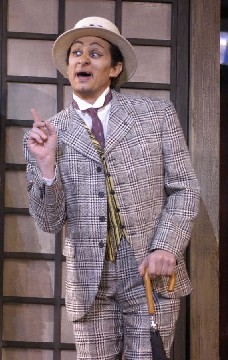 DC:
I'm proud to say that I have done many of the lyric roles that I want
to
do. I've done Tybalt in Romeo and Juliet. I like
that
role, it's a good lyric role with good strong singing. The one I
want to do many, many times is Prunier in La Rondine which I
will
do for the first time in Boston this year. I also have the nice
opportunity
to sing Pedrillo in Mozart's Abduction. That's another
part
which needs lots of different voices in the same role. Sometimes
he has to sing like a heldentenor, and then he's got some quirky, funny
stuff, and also some of the most beautifully long Mozartian lyric lines
that have ever been written. There's a tremendous serenade that
he
gets to sing, which, as far as beauty is concerned, is really second to
none. It's strophic, so it's hard to memorize. Finally I
did,
but it was hard. We did that in Paris last year and I hope to do
that more.
DC:
I'm proud to say that I have done many of the lyric roles that I want
to
do. I've done Tybalt in Romeo and Juliet. I like
that
role, it's a good lyric role with good strong singing. The one I
want to do many, many times is Prunier in La Rondine which I
will
do for the first time in Boston this year. I also have the nice
opportunity
to sing Pedrillo in Mozart's Abduction. That's another
part
which needs lots of different voices in the same role. Sometimes
he has to sing like a heldentenor, and then he's got some quirky, funny
stuff, and also some of the most beautifully long Mozartian lyric lines
that have ever been written. There's a tremendous serenade that
he
gets to sing, which, as far as beauty is concerned, is really second to
none. It's strophic, so it's hard to memorize. Finally I
did,
but it was hard. We did that in Paris last year and I hope to do
that more.
BD: Are you looking at all at David in Meistersinger?
DC: I covered David here at Lyric, so the role
certainly
is learned and ready to go. Any time anybody wants me to do it
I'll
be happy to. Meistersinger productions are few and
far
between. One of the quirks of the industry is to see somebody
with
an Italian name doing all this German repertoire kind of makes people
look
twice. Producers are a little bit leery about using an Italian
singer
– even though I'm American – to sing a lot of these roles, which are
some
of my best, by the way.
BD: Do you want to change your stage name for German
houses?
DC: Believe me, I've thought about it. When
I'm
in Paris I'm thinking about using Cangelois as opposed to Cangelosi –
just
change the last couple letters. I'm trying to think of a German
substitute
for my name…
BD: …but really, you're trying to establish yourself
and your name as a premiere artist in some of these roles.
DC: No question about it. In
anyone's
career you can always point to a signature role.
BD: Now that you're amassing these roles, I assume
that
managements and agents are throwing a lot of other roles at you.
Does it surprise you that you're being asked to do some of these roles?
DC: Yes. I was really surprised. Sometimes in
the opera business impresarios are very unimaginative and they have a
tendency
to pigeonhole people. If one is a leading man, they wouldn't even
think about him doing something funny, or doing a comic role.
BD: Well then, are you trying to create your own
fach?
DC: I am interested in confounding people all over
the
world. I want them to say, “Well what is he?” The answer is
I'm not anything and I'm not everything, but I can do a lot of
things.
I can sing as long and lovely a line as the next guy, and I can sing
with
passion and romance as well as the next guy, and at the same time I can
give you one down and dirty, nasty-sounding voice when it's
required.
Hopefully it's all enveloped in good technique because you can really
get
into trouble if you start stretching your voice in too many directions
without good technique.
BD: Are you still working with a voice teacher?
DC: All the time. All the time. My best
work, however, is when I just sit down alone and experiment in lots of
different ways. There's no one way to sing anything. This
season
at Lyric was somewhat of a challenge because Pagliacci and Susannah
were running concurrently. I would do Beppe one night, with the
beautiful
serenade for which I had to keep the voice so nice and limber, and then
Little Bat the next night, and sometimes another Beppe the following
day,
so sometimes I had troikas.
BD: Is that a good thing to have to switch back and
forth?
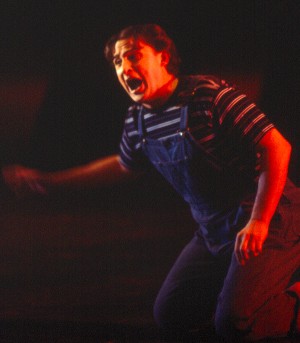 DC:
No. It's a hard thing. It took a lot of discipline because
when you do Little Bat, it's much more dramatic, emotional
singing.
There's that big scene in Act I where he spews forth in a real
anguished
state, telling Susannah that he's told a big lie about her. It's
extremely dramatic. Some nights I would physically cry with tears
in my eyes. It's always a very, very dramatic scene. It
wasn't
put on, either. In fact, after the opening night the conductor
said
to me, “Most people just sort of 'speak–sing' this role, and you really
did sing it, didn't you!” I said, “That's what I tried to
do.”
It's the only way I could be disciplined enough to do Beppe one night,
Little Bat the next and rehearse
Sweeney Todd at the same time.
DC:
No. It's a hard thing. It took a lot of discipline because
when you do Little Bat, it's much more dramatic, emotional
singing.
There's that big scene in Act I where he spews forth in a real
anguished
state, telling Susannah that he's told a big lie about her. It's
extremely dramatic. Some nights I would physically cry with tears
in my eyes. It's always a very, very dramatic scene. It
wasn't
put on, either. In fact, after the opening night the conductor
said
to me, “Most people just sort of 'speak–sing' this role, and you really
did sing it, didn't you!” I said, “That's what I tried to
do.”
It's the only way I could be disciplined enough to do Beppe one night,
Little Bat the next and rehearse
Sweeney Todd at the same time.
BD: Now that your career is getting more settled,
are
you going to turn down some of these roles so that you have a little
space
between performances and you're not singing every day?
DC: I haven't made that decision yet. You
bring
up a really good question. If you're doing a bunch of big roles,
do you want to slip a Spoletta in there if it's offered to you? We
often
make those decisions based on finances. You might think, “Well,
OK,
I'm here anyway, why don't I just work? I can do the role and do
it well, and it's not the most taxing thing, so let me go in and go to
work.”
I'm not trying to say it's just a money thing, but we're in the
business
of singing, and that's how we earn our living. I haven't really
decided
when to turn down a role because I want to give myself a little extra
rest.
Right now, if it's appropriate, I take what comes along and I try to
squeeze
them all in.
BD: Do you do any brand new works - world premieres?
DC: I'm going to be doing Bill Bolcom’s A
Wedding,
which will have its world premiere at Lyric Opera of Chicago the season
after next. He's writing a part for me. I sang for him, and
he's writing a role that's in the screen play into the opera. As
I watched the film, at first I wondered how they're going to make it
into
an opera. But they assure me it's going to be interesting and
different,
so I'm looking forward to it. It will be a new experience for me,
because I really haven't done many world premieres or new works to date.
BD: Is it special to know that he's writing it for
you?
DC: Yeah! It really is. We sat down and I sang
some stuff for him so he could find out where the best part of my
voice was. He said, “I don't know what this role is going to be
yet,
but I'll try to make it interesting and fun for you.” So I'm
really
looking forward to doing that. New works kind of scare me
though.
Not musically, but character-wise because I have nothing to go on.
BD: You're singing lots of opera. Do you also
sing recitals and concerts?
DC: I do not. I have been asked, and I'll be
very
honest with you, I don't have the patience. When I'm on stage, I
have to move. I have got to be doing something. I am the
worst
stand-and-sing singer that exists. I get antsy. I can't
keep
myself in this imaginary square you create for yourself. Recitals
are very challenging, and they're very good for your voice, and I
should
buckle down and do them. I've been very, very busy, but sometimes
I think it would be kind of fun to do because I like French chansons
very
much and I love German lieder. I also like the American song
cycles,
and there are some great Italian song cycles too. Then I get to
thinking
about the roles that have eluded me and there's one I'm really
desperate
to do: the wicked witch in Hansel and Gretel! Some people
laugh, but I think it would just be non-stop fun for me.
BD: There are a few tenors who have done it.
DC: Yes! And I hope it will come, because it's so
much
fun and it's such great music.
BD: You just hit 40. Are you at the point in
your
career you want to be at this age?
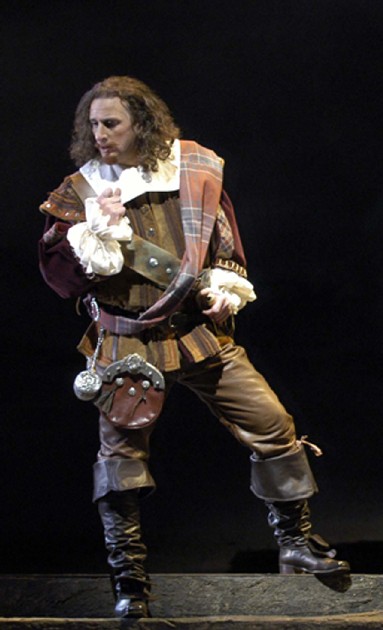 DC:
Yes. Yes. And let's keep in mind that I got into opera
very,
very late. It was only about six years ago, so I've gone a long
way
in the opera business. I've climbed several rungs of the ladder
partially
because people have taken a chance on me. They've given me the
opportunities
and I like to think that I've fulfilled them. Not only am I
exactly
where I want to be, my voice is exactly where I want it to be right
now.
The best singing years for a man should be from age 45 to 60. In
a day and in a culture where success is based upon how young you are,
some
of the great young voices are pushed to the front very quickly because
they're young and they're handsome, or, in the case of women, they're
beautiful.
Good-looking people with young, beautiful voices are pushed out there
in
front to sing big stuff. Everybody wants to grab that brass ring,
and the problem is that a lot of those people get used up very
quickly.
If you are a male in this industry, you have to know that your best
singing
years are your latter singing years, and I feel that my voice is
finally
moving into the realm of prime. I work on my voice constantly.
DC:
Yes. Yes. And let's keep in mind that I got into opera
very,
very late. It was only about six years ago, so I've gone a long
way
in the opera business. I've climbed several rungs of the ladder
partially
because people have taken a chance on me. They've given me the
opportunities
and I like to think that I've fulfilled them. Not only am I
exactly
where I want to be, my voice is exactly where I want it to be right
now.
The best singing years for a man should be from age 45 to 60. In
a day and in a culture where success is based upon how young you are,
some
of the great young voices are pushed to the front very quickly because
they're young and they're handsome, or, in the case of women, they're
beautiful.
Good-looking people with young, beautiful voices are pushed out there
in
front to sing big stuff. Everybody wants to grab that brass ring,
and the problem is that a lot of those people get used up very
quickly.
If you are a male in this industry, you have to know that your best
singing
years are your latter singing years, and I feel that my voice is
finally
moving into the realm of prime. I work on my voice constantly.
BD: So you're positioned just right, then.
DC: I like to think that I am. Maybe I'm
fooling
myself. Maybe I'm just psychologically working myself up to
believe
that, but I am very satisfied with where my voice is and very satisfied
with where my characters lie. I'm very satisfied with the roles
I'm
doing and the roles I have coming up. So in that regard, you're looking
at a satisfied man in an industry where I consistently find it
challenging.
That's what keeps me here. I got bored in the nightclub
business.
I got bored doing Broadway musicals. There's never a boring day
in
the opera house for me. It's a constant challenge to learn
music.
Language work is very appealing to me and I take French lessons and
German
lessons every week. So there's always a forward motion in
everything
that I do in my free time that feeds back to my singing and my stage
work.
BD: You started with the Lyric Opera Center for
American
Artists. Is it nice to come back here now to do bigger roles?
DC: When you sing around the world as I do, you hear
other people who haven't sung here talk about how they wish they could
sing at the Lyric Opera of Chicago, and you start realizing that if
you're
singing in this house, you are a very blessed person. I've had
numerous
offers from the Metropolitan Opera, and the answer has consistently
been,
“No, he's not available because he's doing something at the
Lyric.”
It's always nice to be back here because I feel a part of something
special.
Sometimes they use the word family, and it is like a family here.
I really feel that way. I love the management and I have lots of
friends in the opera house. They have given me every opportunity
to increase. They give me more and more responsibilities every
year.
Sometimes that's hard when you come out of a young artists’ program,
whether
it be the Met or San Francisco or Houston or here in Chicago.
Sometimes
you don't hear much from those young artists after that.
Sometimes
they're kept at just certain levels in the opera house where they were
spawned. But here at the Lyric they have a consistent record of
giving
people an opportunity and letting them climb. Then it's up to
you,
the singer, and your own personality and your own discipline to allow
yourself
to keep moving. They'll give you the opportunity, but you'd
better
make it work.
BD: Thank you so much the work you've already done,
and for the conversation. I look forward to your succeeding
seasons.
DC: It will always be a pleasure to see you around
and
say hello.
= = = =
=
= = = =
- - - - - - - - - - - -
= = = =
=
= = = =
For more details on his career and more photos, visit David
Cangelosi's
personal
website .
To read other interviews with musicians, visit Bruce Duffie's personal
website and send him e-mail
.
Bruce Duffie has been a regular contributor to The Opera
Journal
since 1985. Next time in these pages, a chat with soprano Cheryl
Woods.
©2002 Bruce Duffie
First published in The Opera Journal in April, 2004
All photos courtesy of Lyric Opera of Chicago, Dan Rest,
photographer:
-- In Concert
-- (leaning over anvil) as Mime in Siegfried
-- (kneeling) as Mime (right) with John
Treleaven
in Siegfried
-- (sitting) as Tobias (left) with Judith
Christin
in Sweeney Todd
-- (standing) as the Dancing Master (right) with Laura
Aikin as Zerbinetta in Ariadne auf Naxos
-- (wearing eyepatch) as Dancaïre (left) with
Denyce Graves as Carmen in Carmen
-- (holding umbrella) as Goro in Madama Butterfly
-- (in overalls) as Little Bat in Susannah
-- (wearing Scottish tartan) as Normanno in Lucia
di Lammermoor
 DC:
That's kind of a way to put it, although I didn't croon. In fact
when I would shake hands and meet some people after shows, they'd say,
“Oh, you belong in the opera. You should be in the opera.”
At that time I was still singing baritone and I had sung as a baritone
for years doing musical theatre and what not.
DC:
That's kind of a way to put it, although I didn't croon. In fact
when I would shake hands and meet some people after shows, they'd say,
“Oh, you belong in the opera. You should be in the opera.”
At that time I was still singing baritone and I had sung as a baritone
for years doing musical theatre and what not.
 BD:
So have you been immersing yourself into a lot of Wagner to be able to
do that role?
BD:
So have you been immersing yourself into a lot of Wagner to be able to
do that role?
 DC:
No question. During the forging scene he goes on a little
diatribe
and starts getting all intoxicated with the fact that he thinks he's
smart
enough to fool Siegfried, and Siegfried's going to kill Fafner and then
he's going to get that ring, and then the whole world, including
Alberich,
is going to bow to him. He's real heady. When I did a
recording
of the Forging Scene with Placido Domingo, we spent about eight hours
working
on it. It was a grueling eight hours. That's a hard
scene
to do over and over and over. When we took a break, Placido came
to me and said, “You really do have fun singing, don't you?” and I
said,
“Boy, I sure do.” He told me that he had even entertained the
idea
of possibly singing the role of Siegfried at one time, but after doing
the recording he said, “I just don't think I could get through the
whole
role in one night.” To record it might be one thing, when you can
do it little by little, but Siegfried sings all night long and it's a
really,
really tough singing.
DC:
No question. During the forging scene he goes on a little
diatribe
and starts getting all intoxicated with the fact that he thinks he's
smart
enough to fool Siegfried, and Siegfried's going to kill Fafner and then
he's going to get that ring, and then the whole world, including
Alberich,
is going to bow to him. He's real heady. When I did a
recording
of the Forging Scene with Placido Domingo, we spent about eight hours
working
on it. It was a grueling eight hours. That's a hard
scene
to do over and over and over. When we took a break, Placido came
to me and said, “You really do have fun singing, don't you?” and I
said,
“Boy, I sure do.” He told me that he had even entertained the
idea
of possibly singing the role of Siegfried at one time, but after doing
the recording he said, “I just don't think I could get through the
whole
role in one night.” To record it might be one thing, when you can
do it little by little, but Siegfried sings all night long and it's a
really,
really tough singing.
 DC:
It certainly does! Those were great fun, but it doesn't make me
want
to go back because that chapter is closed. The reason I moved
into
opera seriously was because that was about the only thing in singing
show
business that I hadn't tried, and it was a challenge for me.
DC:
It certainly does! Those were great fun, but it doesn't make me
want
to go back because that chapter is closed. The reason I moved
into
opera seriously was because that was about the only thing in singing
show
business that I hadn't tried, and it was a challenge for me.

 DC:
There are favorite roles that I will do all the time that I'm really
pleased
and happy to do. When Bizet wrote Carmen, he expected his
Don José to be a tenor, of course. Not my kind of tenor,
not
my kind of voice, but everyone always thought the role of Le
Dancaïre
was a baritone and Le Remendado was the tenor. Actually it was
written
for two tenors. Dancaïre was originally listed as a tenor
role,
and Remendado as well, so when Carmens come popping up, I will
never
do Remendado. There have been a couple of administrative
screw-ups,
and they booked two Remendadoes as opposed to a Remendado and a
Dancaïre,
and they asked me if I could switch roles. I said “Yeah, I'll do
the other one,” and ever since I did it that's the only one I'll do
from
now on.
DC:
There are favorite roles that I will do all the time that I'm really
pleased
and happy to do. When Bizet wrote Carmen, he expected his
Don José to be a tenor, of course. Not my kind of tenor,
not
my kind of voice, but everyone always thought the role of Le
Dancaïre
was a baritone and Le Remendado was the tenor. Actually it was
written
for two tenors. Dancaïre was originally listed as a tenor
role,
and Remendado as well, so when Carmens come popping up, I will
never
do Remendado. There have been a couple of administrative
screw-ups,
and they booked two Remendadoes as opposed to a Remendado and a
Dancaïre,
and they asked me if I could switch roles. I said “Yeah, I'll do
the other one,” and ever since I did it that's the only one I'll do
from
now on.
 DC:
I'm proud to say that I have done many of the lyric roles that I want
to
do. I've done Tybalt in Romeo and Juliet. I like
that
role, it's a good lyric role with good strong singing. The one I
want to do many, many times is Prunier in La Rondine which I
will
do for the first time in Boston this year. I also have the nice
opportunity
to sing Pedrillo in Mozart's Abduction. That's another
part
which needs lots of different voices in the same role. Sometimes
he has to sing like a heldentenor, and then he's got some quirky, funny
stuff, and also some of the most beautifully long Mozartian lyric lines
that have ever been written. There's a tremendous serenade that
he
gets to sing, which, as far as beauty is concerned, is really second to
none. It's strophic, so it's hard to memorize. Finally I
did,
but it was hard. We did that in Paris last year and I hope to do
that more.
DC:
I'm proud to say that I have done many of the lyric roles that I want
to
do. I've done Tybalt in Romeo and Juliet. I like
that
role, it's a good lyric role with good strong singing. The one I
want to do many, many times is Prunier in La Rondine which I
will
do for the first time in Boston this year. I also have the nice
opportunity
to sing Pedrillo in Mozart's Abduction. That's another
part
which needs lots of different voices in the same role. Sometimes
he has to sing like a heldentenor, and then he's got some quirky, funny
stuff, and also some of the most beautifully long Mozartian lyric lines
that have ever been written. There's a tremendous serenade that
he
gets to sing, which, as far as beauty is concerned, is really second to
none. It's strophic, so it's hard to memorize. Finally I
did,
but it was hard. We did that in Paris last year and I hope to do
that more.
 DC:
No. It's a hard thing. It took a lot of discipline because
when you do Little Bat, it's much more dramatic, emotional
singing.
There's that big scene in Act I where he spews forth in a real
anguished
state, telling Susannah that he's told a big lie about her. It's
extremely dramatic. Some nights I would physically cry with tears
in my eyes. It's always a very, very dramatic scene. It
wasn't
put on, either. In fact, after the opening night the conductor
said
to me, “Most people just sort of 'speak–sing' this role, and you really
did sing it, didn't you!” I said, “That's what I tried to
do.”
It's the only way I could be disciplined enough to do Beppe one night,
Little Bat the next and rehearse
Sweeney Todd at the same time.
DC:
No. It's a hard thing. It took a lot of discipline because
when you do Little Bat, it's much more dramatic, emotional
singing.
There's that big scene in Act I where he spews forth in a real
anguished
state, telling Susannah that he's told a big lie about her. It's
extremely dramatic. Some nights I would physically cry with tears
in my eyes. It's always a very, very dramatic scene. It
wasn't
put on, either. In fact, after the opening night the conductor
said
to me, “Most people just sort of 'speak–sing' this role, and you really
did sing it, didn't you!” I said, “That's what I tried to
do.”
It's the only way I could be disciplined enough to do Beppe one night,
Little Bat the next and rehearse
Sweeney Todd at the same time.
 DC:
Yes. Yes. And let's keep in mind that I got into opera
very,
very late. It was only about six years ago, so I've gone a long
way
in the opera business. I've climbed several rungs of the ladder
partially
because people have taken a chance on me. They've given me the
opportunities
and I like to think that I've fulfilled them. Not only am I
exactly
where I want to be, my voice is exactly where I want it to be right
now.
The best singing years for a man should be from age 45 to 60. In
a day and in a culture where success is based upon how young you are,
some
of the great young voices are pushed to the front very quickly because
they're young and they're handsome, or, in the case of women, they're
beautiful.
Good-looking people with young, beautiful voices are pushed out there
in
front to sing big stuff. Everybody wants to grab that brass ring,
and the problem is that a lot of those people get used up very
quickly.
If you are a male in this industry, you have to know that your best
singing
years are your latter singing years, and I feel that my voice is
finally
moving into the realm of prime. I work on my voice constantly.
DC:
Yes. Yes. And let's keep in mind that I got into opera
very,
very late. It was only about six years ago, so I've gone a long
way
in the opera business. I've climbed several rungs of the ladder
partially
because people have taken a chance on me. They've given me the
opportunities
and I like to think that I've fulfilled them. Not only am I
exactly
where I want to be, my voice is exactly where I want it to be right
now.
The best singing years for a man should be from age 45 to 60. In
a day and in a culture where success is based upon how young you are,
some
of the great young voices are pushed to the front very quickly because
they're young and they're handsome, or, in the case of women, they're
beautiful.
Good-looking people with young, beautiful voices are pushed out there
in
front to sing big stuff. Everybody wants to grab that brass ring,
and the problem is that a lot of those people get used up very
quickly.
If you are a male in this industry, you have to know that your best
singing
years are your latter singing years, and I feel that my voice is
finally
moving into the realm of prime. I work on my voice constantly.